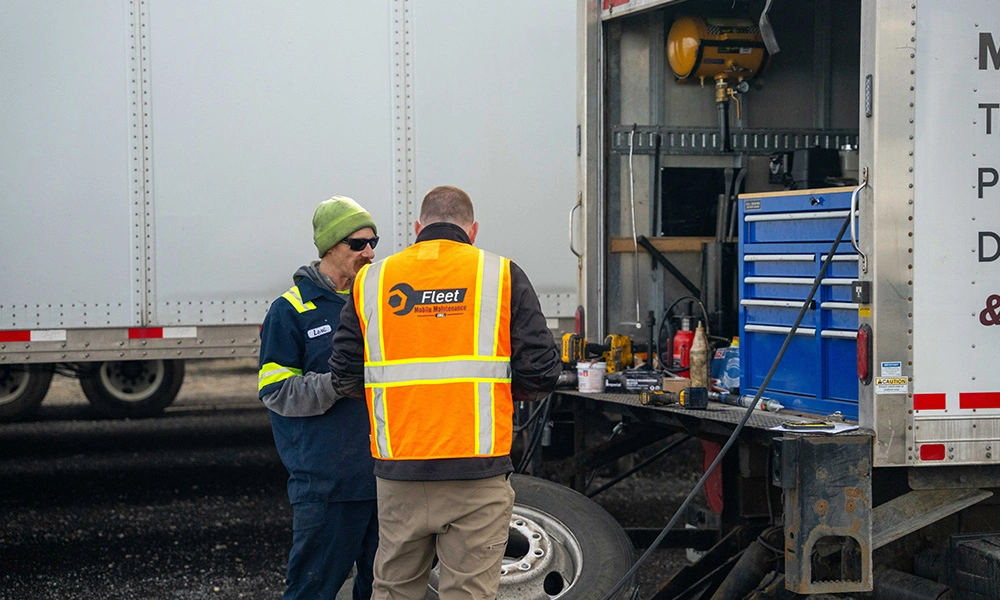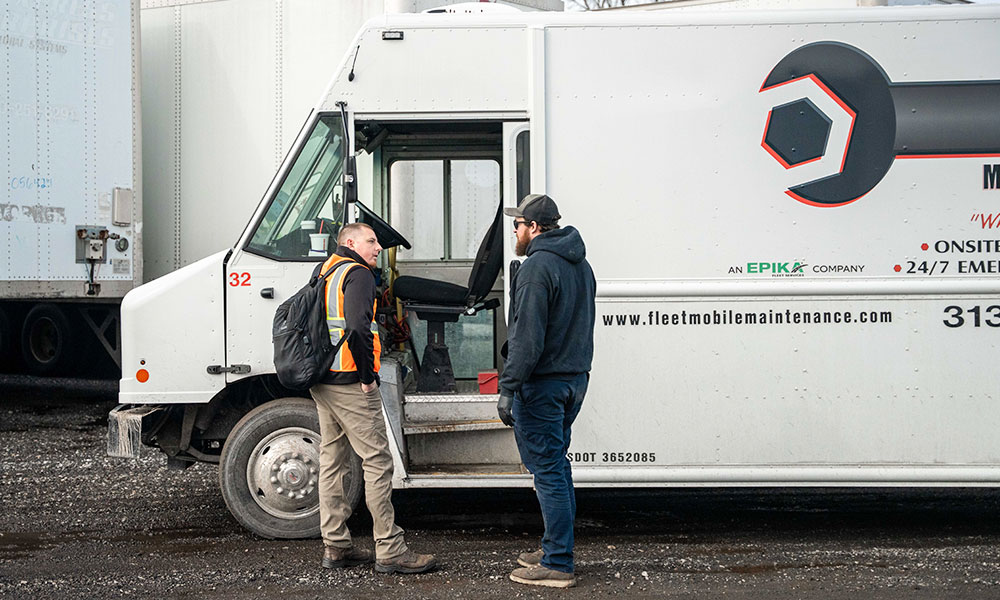IRS Mileage Log Requirements for Fleet Businesses (2026)

For fleet businesses, vehicle expenses often make up a significant portion of operation costs. For instance, the most common vehicular costs include routine wear and tear, unscheduled repairs after breakdowns, and volatile fuel rates. However, one of the best ways to save on these costs and lower your taxable income is by properly tracking your business miles in compliance with the IRS mileage log requirements.
By maintaining an IRS-compliant mileage log, you may qualify to claim tax deductions, minimize your overall operational costs, and stay on the right side of IRS regulations. Missing out on these requirements can result in denied claims, increased audits, or even penalties.
Moreover, fleet businesses can further cut vehicular costs and maximize savings by choosing the right fleet maintenance provider. With Epika’s preventative maintenance services, you can cut back on reactive repairs, improve vehicle lifespan, minimize downtime, and lower your long-term vehicle expenses, which further reduces overall operational costs and maximizes revenue (a win-win).
In this blog, we have outlined the IRS mileage log requirements to make tracking your miles simpler and stress-free. We’ll also highlight how working with Epika for fleet maintenance can help you save even more on vehicle costs and reduce your taxable income.
Why Is It Important for Fleet Businesses to Track Mileage?
Increased vehicle expenses can significantly reduce the profit of fleet businesses. Therefore, IRS has given the advantage of reducing a business’s tax exposure through mileage deductions for valuable savings. However, to claim tax deductions, businesses need to log miles accurately according to IRS mileage log requirements.
By maintaining an IRS compliant mileage log, you can:
- Claim Valuable Tax Deductions
Accurately document business miles to lower taxable income and improve audit resilience - Receive Employer Reimbursements
If you’re an employee, detailed mileage records ensure hassle-free reimbursement - Manage Fleet More Efficiently
IRS mileage tracker also provides you with relevant information to improve routing, dispatching, and vehicle utilization

Manage Your Fleet More Safely and Efficiently with Epika
At Epika, we offer reliable, preventative fleet maintenance services to keep your fleets operating safely, and efficiently; without extra downtime. Choose us for your fleet maintenance and keep your vehicles going right, from mile one to mile one million.
To claim tax deductions, you need to maintain an accurate mileage log for taxes that document all your business-related trips. This requirement applies to whether you claim through the IRS standard mileage deduction or the actual expenses deduction.
Using the IRS Standard Mileage Method
The standard mileage rate is the specific dollar amount allowed by the IRS for businesses to deduct from their taxable income, per mile driven for business purposes.
The IRS standard mileage method covers vehicle expenses such as fuel, maintenance, and depreciation. This is the simplest and easiest method to track mileage, as you only have to keep track of how many miles you and your employees drove for business throughout the year.
Additionally, if a company uses GPS tracking for their vehicle fleet, it becomes easier to generate the mileage report.

The IRS standard mileage rate is set annually. For tax year 2026, the standard mileage rate for businesses is 70 cents per mile.
Consider an example of a fleet with ten trucks. On average, each truck drives about 2,500 miles per week, totaling 10,000 miles per month. Over the course of a year, that’s 120,000 miles per truck. For the entire fleet, that adds up to 1,200,000 miles annually. Using the standard mileage rate of $0.70 per mile, the business could claim a mileage tax deduction of $840,000—an impressive saving
Using the Actual Expenses Method
The actual expenses method is a slightly complicated method to log business miles.
To maintain a mileage log under the actual expenses method, you need to track all of the actual expenses of using your vehicle. This includes fuel, maintenance, repairs, insurance and depreciation. Then, you deduct the amount of the expenses attributed to your business based on the percentage of the vehicle used for business purposes.
To calculate this percentage, you need to track and document the total number of miles driven during the year, for both business and personal use. Then, you divide the business mileage by the total mileage.
However, one thing you need to make sure of when maintaining a mileage log using the actual expenses method is to keep all your receipts and service records. If you lose these documents, you might miss out on tax deductions or face penalties if the IRS audits your business.
Consider an example where a vehicle is used for 10,000 miles, half of which (5,000, or 50%) are business miles. This vehicle also costs $9,500 to operate throughout the year.
At the standard mileage rate of 70 cents per mile for 2026, this vehicle would qualify for a $3,500 deduction. However, under the actual expenses method, the vehicle could deduct 50% of its total operating costs, amounting to $4,750. This is calculated by multiplying the total vehicle expenses by the percentage of business use. If, in the following year, the same vehicle paid off its lease, obtained less expensive insurance, and reduced its total operating costs to $5,000, then 50% of that would be $2,500—resulting in a smaller deduction compared to the standard mileage method.
This comparison underscores why fleet operators should re-evaluate deduction methods annually. Sticking to one method could lead to missed savings, especially as operating costs fluctuate. Therefore, choose the method that aligns best with your fleet’s financial situation each year.

PRO TIP: Log your trips at the point of completion to maintain accurate, time-stamped records, and meet mileage log requirements for IRS.
Note: According to the IRS, parking fees and tolls related to business use are separately deductible, regardless of whether you use the standard mileage rate or actual expenses method.
Standard Mileage vs. Actual Expenses: Which Method Is Best?
Now, that you know both methods to claim tax deductions, the best deduction method depends upon your situation.
For a vehicle you own, you must choose the standard mileage method for the first year you use the vehicle for business. By choosing the standard deduction method, you can choose to use the standard mileage rate or actual expenses deduction method in later years.
On the other hand, if you use the actual expenses method in the first year, you’re locked into that method for future years.
For a vehicle you lease, you must use the standard mileage rate method for the entire lease period (including renewals) if you choose the standard mileage rate.
IRS Mileage Log Requirements
With the recent increase in the IRS standard mileage rate, i.e. 70 cents per mile (effective January 1, 2026), it is high time for fleet businesses to accurately track business mileage to claim valuable tax deductions.

To claim tax deductions, there are a few IRS mileage log requirements that you need to keep track of to prove the accuracy and business necessity of the expenses. This includes:
- Total annual mileage
Number of miles you drove the vehicle throughout the year for both business and personal use - Annual business mileage
Number of miles you drove the vehicle for specifically business use - Per-use business mileage
Number of miles you drove the vehicle for each business-related trip - Date of use
Date and time you used the vehicle for business travel - Business destination
Place where you drove the vehicle
Note: Daily commutes to and from your regular work site are not tax-deductible and shouldn’t be logged. - Purpose
The purpose of the business trip
Should I Track Personal Mileage?
As per IRS mileage tracking requirements, your personal trips are not required. However, if you use the same vehicle for company-related trips and personal use, it is strongly recommended to include personal trips in your mileage report.
Logging miles driven for personal use also provides clarity for both yourself and the IRS, since fleet companies need to separate total business mileage, total personal mileage, and total commuting mileage for the year.
How to Create a Business Mileage Log
No matter which method you choose to maintain your mileage log – standard mileage rate or actual expenses method; you need to note your vehicle’s mileage at the beginning and end of each year.
Following are the IRS mileage log requirements for business-related trips that you need to keep track of:
- Date of business travel
- Starting and ending point of the trip
- An odometer reading at the start and end of the trip to calculate mileage for the trip
- Reason for travel
- Other travel expenses such as parking and toll receipts
Fleet businesses commonly record this information and create a mileage report through paper mileage logs or mileage tracking apps.
Paper Mileage Logs
Paper mileage logs are the most traditional way to track fleet expenses. You can use a simple notebook that is specifically designed to maintain mileage logs. Just make sure your entries include all the relevant information (as mentioned above) to meet IRS mileage log requirements.
While a paper log is cost-effective, it is more error-prone, and susceptible to being misplaced, which makes it less reliable. Moreover, it also requires consistent manual tracking which can be time-consuming.
Mileage Tracking Apps
Using mileage tracking apps that are linked to your fleet management software is a more convenient method to maintain a mileage log. It mitigates the risk of human error, improves accuracy, and offers real-time insights.
These mileage tracking apps use GPS to track your travel, enable you to categorize each trip as business or personal within the app, and log miles in real time. Many apps also allow you to export IRS-compliant mileage logs, which saves more time and makes tracking much easier.
How Long Should You Keep Business Mileage Records?
The primary reason for a mileage report is to support your claims of business mileage in the event of an audit that requires the IRS to see your records.
As stated by IRS:
“You must keep records that support your deduction (or an item of income) for 3 years from the date you file the income tax return on which the deduction is claimed. A return filed early is considered filed on the due date.“
However, if an auditor finds that you underreport income or file a fraudulent return, the IRS can audit returns from as far back as six years or more. Therefore, to be on the safe side, it is important to store mileage logs, fuel receipts, maintenance records, and supporting documentation for at least 7 years.
How Epika Fleet Can Help You Reduce Your Taxable Income?
Preventative fleet maintenance and repairs are a great investment that can save your business thousands of dollars in the long run. By choosing Epika as your fleet maintenance service provider, you can schedule preventive maintenance, track vehicle performance, lower your long-term vehicle expenses and reduce downtime.

We offer personalized preventative maintenance services for businesses that operate commercial fleets, from light-duty gas automotive vehicles to medium and heavy-duty diesel trucks, trailers, and equipment. With real-time data and automated reminders, we help fleet businesses of any size avoid unnecessary repairs and reduce operational costs. These cost-saving measures help reduce your company’s taxable income, providing you with valuable financial benefits and greater long-term savings.
Partner with Epika to keep your fleet on the road, reduce downtime, and stay tax-efficient.
FAQs
Is there a state-by-state mileage log requirement for truck drivers?
No, there aren’t such state-by-state mileage log requirements for truck drivers. Every state requires commercial vehicle drivers to maintain a completed logbook each day. This logbook will record their driving time, location, purpose of the trip, and number of miles the vehicle is driven.
Can fleet businesses use a mileage tracking app to track vehicle usage?
Yes, fleet businesses can use a mileage tracking app to easily monitor vehicle usage and track mileage accurately. However, please note that it is important to document the purpose of each business-related trip to make sure every mile is accounted for. You may also categorize trips as business or personal directly within the app to simplify record-keeping.
Do you need to retain mileage logs?
For businesses, it is important to keep mileage logs for 3 years from the date you file the income tax return on which the deduction is claimed.
However, employees who give their records and documentation to their employers and are reimbursed for their expenses are typically not required to keep copies of mileage logs. However, you may have to prove your expenses under any of the following circumstances:
- You claim deductions for expenses that are more than reimbursements
- Your expenses are reimbursed under a non-accountable plan
- Your employer doesn’t use adequate accounting procedures to verify expense accounts
What is the risk of being audited over mileage deductions?
Mileage deductions are extremely common, and the IRS has a good idea if those deductions are accurate or not. Unless your claims are excessive, like claiming 100% business use of a vehicle, or there’s an issue with your paperwork, the risk of being audited over mileage logs is quite low.
Can I get audited over my mileage claims?
Mileage audits are rare, but they do happen, especially when claims seem inflated or poorly documented. In any case, if it does, you can support your claims by showing a detailed and accurate IRS compliant mileage log with trip dates, destinations, purpose, and odometer readings.
What formats does the IRS accept for mileage logs?
The IRS doesn’t require a particular format for mileage logs. If your mileage report contains all the required information about the business use of a vehicle, i.e. date of travel, the purpose of the trip, starting and ending point of the trip, and odometer reading at these points; it is acceptable.
Acceptable formats include paper logs, spreadsheets, PDFs, or app-generated reports — as long as they’re complete and consistent.
Conclusion
For fleet businesses, accurately tracking vehicle expenses is important to streamline operations and maximize tax savings. One way to achieve this is by adhering to IRS mileage log requirements. By maintaining an IRS-compliant mileage log, you can maximize tax deductions and reduce taxable income.
Additionally, businesses can also cut vehicle expenses by partnering with a trusted fleet maintenance service provider, such as Epika. With our preventative maintenance services and on-time repairs, fleets can optimize the uptime and lifespan of vehicles, which further lowers operational costs and increases tax savings.
Try us out today, and minimize downtime while maximizing safety, performance, and savings!
